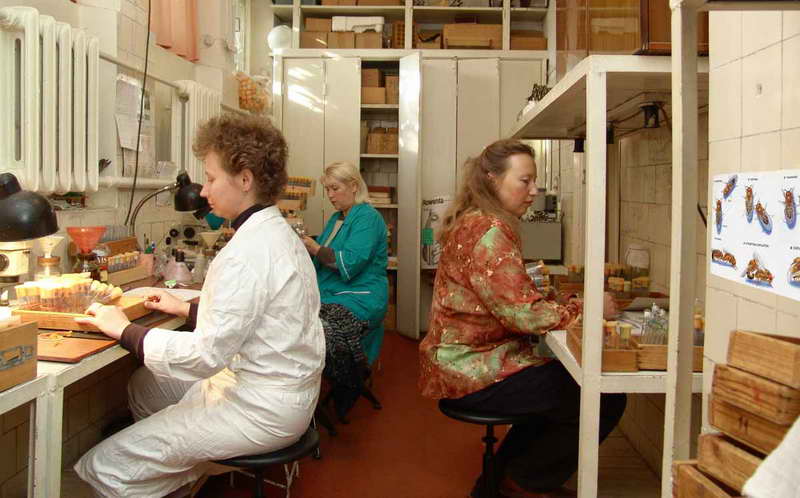The Laboratory was founded in 1950 under the guidance of Prof. M. E. Lobashev. Its staff included Prof. A. K. Voskresenskaya, Prof, N. G. Lopatina, Prof. I. A. Nikitina, Prof. V. B. Savvateev, and Prof. V. V. Ponomarenko. The initial investigations established an important role of conditional reflexes in insect behavior and physiological mechanisms of their adaptation to environment; a statement was formulated of parallelism of development of functions of the nervous system in proto- and deiterostomatic animals; a new concept was introduced of the « signal heredity » that means succession of the individually acquired experience between members of the shoal, herd, family.
In studies on genetics of conditional reflexes, which were carried out since 1954 both on vertebrates (hens, sturgeons) and on invertebrates (honeybees) there were revealed genetically determined correlations of a number of peculiarities of learning, complex forms of the social signal behavior and such neurophysiological signs as excitability of the nerve-muscle apparatus, the rate of narcotization, etc. Inheritance of these correlated signs was established to often occur by the maternal line (phenomenon of matroclinia).
Since 1965 the Laboratory was headed by Pãof. V. V. Ponomarenko. She was one of the first to propose studying behavioral and neurological effects of mutations of individual genes, which became for long years the methodological ground of behavioral genetics. Study of effects of homologous mutations of honeybee and Drosophila blocking consecutive stages of the kinurenin pathway of tryptophan metabolism has led to detection of role of kinurenins in functioning of the nervous system in insects and provided prerequisites for their studies of their pharmacological effects in mammals. These investigations continue at the Institute at present, at the new methodical level, by combined efforts of three Laboratories of genetic profile.
 Prof. V. V. Ponomarenko formulated hypothesis of neurohormonal regulation of genetical and cytogenetical processes. According to her ideas, functioning of genes is important not only for the organism development, but also for functioning of the current needs of the adult organism. Activity of the nervous system regulates activity of genes in various tissues and thereby affects occurrence of physiological processes in cells by adapting the organism to changing environmental conditions. Activity of genes in the nerve cells themselves also is submitted to the neurohormonal regulation, which provides plasticity of neuronal activity and behavior. At present this hypothesis can be considered to be proven completely, as the process of formation of the long-term memory trace is now known to be accompanied by several waves of gene activation in the central nervous system. Prof. V. V. Ponomarenko formulated hypothesis of neurohormonal regulation of genetical and cytogenetical processes. According to her ideas, functioning of genes is important not only for the organism development, but also for functioning of the current needs of the adult organism. Activity of the nervous system regulates activity of genes in various tissues and thereby affects occurrence of physiological processes in cells by adapting the organism to changing environmental conditions. Activity of genes in the nerve cells themselves also is submitted to the neurohormonal regulation, which provides plasticity of neuronal activity and behavior. At present this hypothesis can be considered to be proven completely, as the process of formation of the long-term memory trace is now known to be accompanied by several waves of gene activation in the central nervous system.
Under the guidance of Prof. V. V. Ponomarenko there was continued analysis of regularities and adaptive significance of inheritance by the maternal line of physiological and behavioral signs in sturgeons.
Since 2000 the Laboratory is headed by a Prof. V. V. Ponomarenko's pupil, Biological Sciences Doctor N.G. Kamyshev. Under his guidance there were revealed the earlier unknown forms of mutual learning of Drosophila individuals, which occurs in a group situation; proposed and experimentally substantiated physiological model of elaboration of the conditional reflex suppression of “courting” in Drosophila males; isolated and currently studied are four new autosomal P-insertional Drosophila mutants with defects of memory after elaboration of the conditional reflex suppression of the «courting». The Drosophila genes are searched for, whose conditional superexpression in the maternal organism affects postembryonic development and behavior of offspring (study of mechanisms of the late maternal effect).
Also studied are genetical bases, physiological and neurochemical mechanisms of the occurrence of stress in rats in the connection of their position in social hierarchy (Biological Sciences Doctor D. A. Zhukov). |